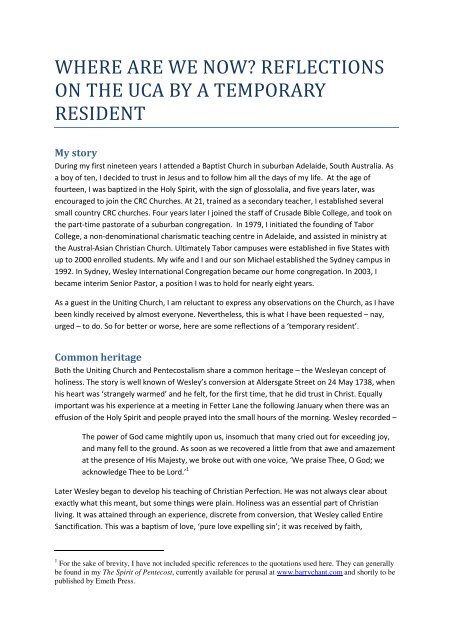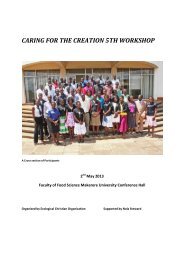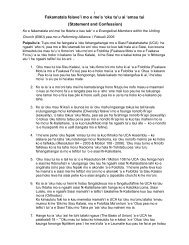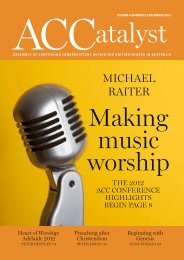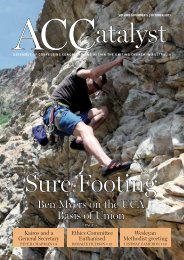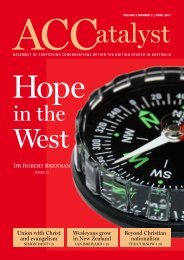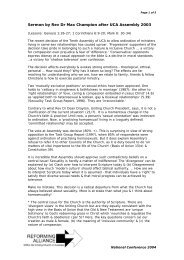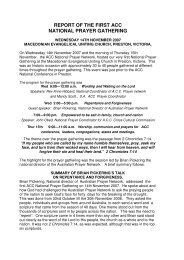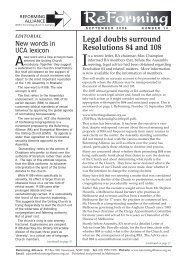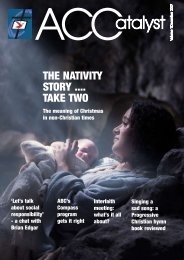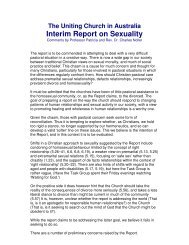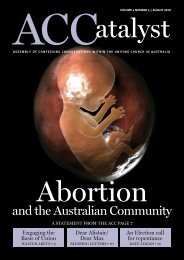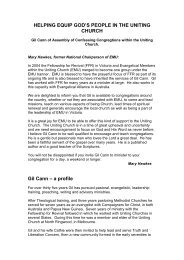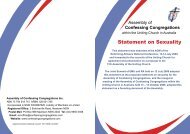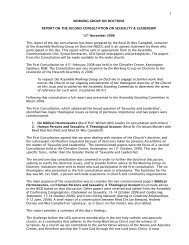where are we now? - Assembly of Confessing Congregations
where are we now? - Assembly of Confessing Congregations
where are we now? - Assembly of Confessing Congregations
You also want an ePaper? Increase the reach of your titles
YUMPU automatically turns print PDFs into web optimized ePapers that Google loves.
WHERE ARE WE NOW? REFLECTIONS<br />
ON THE UCA BY A TEMPORARY<br />
RESIDENT<br />
My story<br />
During my first nineteen years I attended a Baptist Church in suburban Adelaide, South Australia. As<br />
a boy <strong>of</strong> ten, I decided to trust in Jesus and to follow him all the days <strong>of</strong> my life. At the age <strong>of</strong><br />
fourteen, I was baptized in the Holy Spirit, with the sign <strong>of</strong> glossolalia, and five years later, was<br />
encouraged to join the CRC Churches. At 21, trained as a secondary teacher, I established several<br />
small country CRC churches. Four years later I joined the staff <strong>of</strong> Crusade Bible College, and took on<br />
the part-time pastorate <strong>of</strong> a suburban congregation. In 1979, I initiated the founding <strong>of</strong> Tabor<br />
College, a non-denominational charismatic teaching centre in Adelaide, and assisted in ministry at<br />
the Austral-Asian Christian Church. Ultimately Tabor campuses <strong>we</strong>re established in five States with<br />
up to 2000 enrolled students. My wife and I and our son Michael established the Sydney campus in<br />
1992. In Sydney, Wesley International Congregation became our home congregation. In 2003, I<br />
became interim Senior Pastor, a position I was to hold for nearly eight years.<br />
As a guest in the Uniting Church, I am reluctant to express any observations on the Church, as I have<br />
been kindly received by almost everyone. Nevertheless, this is what I have been requested – nay,<br />
urged – to do. So for better or worse, here <strong>are</strong> some reflections <strong>of</strong> a ‘temporary resident’.<br />
Common heritage<br />
Both the Uniting Church and Pentecostalism sh<strong>are</strong> a common heritage – the Wesleyan concept <strong>of</strong><br />
holiness. The story is <strong>we</strong>ll k<strong>now</strong>n <strong>of</strong> Wesley’s conversion at Aldersgate Street on 24 May 1738, when<br />
his heart was ‘strangely warmed’ and he felt, for the first time, that he did trust in Christ. Equally<br />
important was his experience at a meeting in Fetter Lane the following January when there was an<br />
effusion <strong>of</strong> the Holy Spirit and people prayed into the small hours <strong>of</strong> the morning. Wesley recorded –<br />
The po<strong>we</strong>r <strong>of</strong> God came mightily upon us, insomuch that many cried out for exceeding joy,<br />
and many fell to the ground. As soon as <strong>we</strong> recovered a little from that a<strong>we</strong> and amazement<br />
at the presence <strong>of</strong> His Majesty, <strong>we</strong> broke out with one voice, ‘We praise Thee, O God; <strong>we</strong><br />
ack<strong>now</strong>ledge Thee to be Lord.’ 1<br />
Later Wesley began to develop his teaching <strong>of</strong> Christian Perfection. He was not always clear about<br />
exactly what this meant, but some things <strong>we</strong>re plain. Holiness was an essential part <strong>of</strong> Christian<br />
living. It was attained through an experience, discrete from conversion, that Wesley called Entire<br />
Sanctification. This was a baptism <strong>of</strong> love, ‘pure love expelling sin’; it was received by faith,<br />
1 For the sake <strong>of</strong> brevity, I have not included specific references to the quotations used here. They can generally<br />
be found in my The Spirit <strong>of</strong> Pentecost, currently available for perusal at www.barrychant.com and shortly to be<br />
published by Emeth Press.
‘instantaneously, in one moment’ and resulted in a life free from deliberate sin. This sounds, at least<br />
in part, not unlike a description <strong>of</strong> the Fetter Lane experience.<br />
A century and a half later, Methodists all over the world <strong>we</strong>re crying out to God for such an<br />
experience and many found themselves not only filled with love and joy, but also speaking n<br />
tongues. The Los Angeles Azusa Street story (1906) is the best k<strong>now</strong>n example <strong>of</strong> this. But it is a<br />
model that was replicated in many nations – including Australia.<br />
Ho<strong>we</strong>ver, the Methodist Church as a whole did not follow the Wesleyan direction, which some saw<br />
as an indication <strong>of</strong> a dangerous decline. At the 1912 Methodist Conference, W G Taylor, first<br />
Superintendent <strong>of</strong> Wesley Mission decl<strong>are</strong>d, ‘Back to Wesley Back to the upper room! Rekindle the<br />
waning fires <strong>of</strong> the Church’s inner life!’ And on another occasion, ‘Apostolic methods will still<br />
produce apostolic results… I tremble as I think <strong>of</strong> the b<strong>are</strong> possibility <strong>of</strong> this work ever being shifted<br />
from its old moorings. Disaster would be bound to follow.’ It was a prophetic word.<br />
BASIS OF UNION<br />
The 1977 Basis <strong>of</strong> Union is a pr<strong>of</strong>ound document in many ways. In fact, there <strong>are</strong> those in the UC<br />
who seem to regard it more highly than Scripture! It was c<strong>are</strong>fully crafted and generally sound.<br />
Ho<strong>we</strong>ver, given its background, the merging <strong>of</strong> three significant denominations, each with a<br />
different heritage, it is not surprising that there is a lack <strong>of</strong> clarity and definition in some <strong>are</strong>as.<br />
Paragraph One’s statement on the return <strong>of</strong> Christ, for example, is broad enough to encompass a<br />
wide range <strong>of</strong> views—from a literal physical return to a spiritual or even symbolic parousia.<br />
The third paragraph, although hailed by many as perhaps the most pr<strong>of</strong>ound in the document, does<br />
not address clearly the question <strong>of</strong> personal repentance and conversion to Christ. While stating<br />
plainly that the Church confesses Christ as Lord and that all people <strong>are</strong> called to faith in him, the<br />
need for a Wesleyan-type encounter with God through Christ is not to be found.<br />
The description <strong>of</strong> the Scriptures as ‘a unique prophetic and apostolic testimony, in which it [the<br />
Church] hears the Word <strong>of</strong> God’ proved controversial from the beginning. It was this clause as much<br />
as any which prevented some ministers and churches from participating in Union. 2 While its<br />
intention was evidently to allow for people to distinguish bet<strong>we</strong>en passages referring to localised<br />
and cultural practices from those that <strong>we</strong>re universally applicable, it was also seen by some<br />
evangelicals as allowing readers to choose for themselves which parts <strong>we</strong>re to be regarded as the<br />
Word <strong>of</strong> God. To them, believing as they do (and as I do) that all Scripture is inspired by God (2<br />
Timothy 3:16), this was too subjective and hence unacceptable.<br />
THE GREAT COMMAND<br />
The strength <strong>of</strong> the UC lies in its adherence to the Great Command (John 13:34). The very name<br />
‘Uniting’ implies both a desire and a willingness to work with others and to continue the process <strong>of</strong><br />
Union rather than seeing it as a fait accompli.<br />
2 At the time <strong>of</strong> Union, some evangelical Presbyterians and Congregationalists formed ‘continuing’<br />
denominations. There <strong>we</strong>re also some Methodists who did not participate, but continued as independent<br />
congregations or joined another movement.
The Church is k<strong>now</strong>n for its c<strong>are</strong> and concern for the poor and underprivileged. This is<br />
demonstrated, for example, in the work <strong>of</strong> UnitingC<strong>are</strong> and UnitingWorld. It is also seen in the<br />
Church’s advocacy for the cause <strong>of</strong> refugees, <strong>of</strong> indigenous people, <strong>of</strong> social justice for the work<br />
force, and so on.<br />
The Exodus Foundation is an example <strong>of</strong> dedicated and compassionate work for the needy. Under<br />
the leadership <strong>of</strong> Bill Crews,<br />
The Exodus Foundation Support Services team strives to create a sense <strong>of</strong> belonging and self<br />
worth – something everyone hopes for and deserves. The team is committed to affirming and<br />
validating all individuals, developing and nurturing trust and respect bet<strong>we</strong>en staff and clients,<br />
providing a pr<strong>of</strong>essional and confidential service, and identifying and responding promptly to<br />
emerging issues and needs. Nearly one thousand requests for assistance <strong>are</strong> received each month by the<br />
Foundation. 3<br />
Of course, Wesley Mission is in the forefront <strong>of</strong> <strong>we</strong>lf<strong>are</strong> work and concern, with its huge budget and<br />
its staff <strong>of</strong> 2,500 people. Wesley ministers to the sick, the elderly, the homeless, the poor, the young,<br />
the victims <strong>of</strong> substance abuse, the abandoned, the lonely and the abused.<br />
There is little doubt that those who <strong>are</strong> engaged in <strong>are</strong>as like these have a genuine concern for<br />
people in need and see their ministry as truly reflecting the compassion <strong>of</strong> Christ. The Basis <strong>of</strong> Union<br />
affirms, ‘The Uniting Church will keep its law under constant review so that it life may increasingly be<br />
directed to the service <strong>of</strong> God and humanity…’ (#17).<br />
The Basis <strong>of</strong> Union expresses the desire to provide an environment <strong>where</strong> there is provision for<br />
‘difference <strong>of</strong> opinion in matters which do not enter into the substance <strong>of</strong> the faith’ (#14). The result<br />
is that, although the term is not specifically spelled out in the Basis <strong>of</strong> Union, ‘inclusiveness’ has<br />
become a watchword in the UC. Indeed, one the great strengths <strong>of</strong> the UC is its willingness to<br />
accept anyone, regardless <strong>of</strong> who they <strong>are</strong>. I myself am an example <strong>of</strong> this – a Pentecostal preacher<br />
being accepted as senior pastor <strong>of</strong> Wesley International Congregation, the largest UC congregation<br />
in the State.<br />
THE GREAT COMMISSION<br />
The Basis <strong>of</strong> Union talks in general terms about the need to ‘hear anew the commission <strong>of</strong> the Risen<br />
Lord to make disciples <strong>of</strong> all nations’ (#1). Ironically, on this question, the Basis <strong>of</strong> Union is <strong>of</strong>ten<br />
conveniently overlooked. In practice, evidence <strong>of</strong> the Great Commission (Mark 16:15, 16) being<br />
implemented is sometimes not easy to find. The Board <strong>of</strong> Mission in NSW is one <strong>of</strong> the bright spots<br />
in the Church and individual congregations <strong>are</strong> attempting evangelism, but they <strong>are</strong> clearly a<br />
minority.<br />
Certainly, the UC is in decline. A recent promotion <strong>of</strong> a one day symposium refers unashamedly to<br />
‘our ageing and declining membership’. 4 While the Australian population increases by around 7%<br />
every five years, the Uniting Church has decreased steadily since its inception. In 1976,<br />
3 See http://www.billcrews.com.au/htm/exodus.htm?our_services/our_services<br />
4 ‘Are <strong>we</strong> United or Uniting? A one day symposium’. UTC promotional leaflet, October 2010.
Congregationalists, Methodists and Presbyterians represented 19.4% <strong>of</strong> the population; in 1981, the<br />
Uniting Church represented 15.2%; in 1986, 13.1%; in 1991, 8.2%; in 2001, 6.6%.<br />
Plainly, union is not in itself a cause <strong>of</strong> growth. While I am sure it pleases the Father for his children<br />
to work together, it must be in a spirit <strong>of</strong> faith and in the po<strong>we</strong>r <strong>of</strong> the Holy Spirit. Tying two sinking<br />
ships together will not stop them sinking.<br />
In a Sydney Presbytery meeting a few years back, one speaker told how a Muslim family <strong>we</strong>re<br />
attending his church and he actually tried to talk them out <strong>of</strong> being baptized (presumably so they<br />
would feel accepted as they <strong>we</strong>re). As it happened, they insisted on baptism and he <strong>we</strong>nt ahead.<br />
More recently, there has been the debate on the proposed new Preamble to the Constitution. The<br />
syncretism implied in this document seems to be seen as a virtue by many people. Yet it clearly flies<br />
in the face <strong>of</strong> the Great Commission.<br />
In a statement prep<strong>are</strong>d by Wesley Mission, <strong>we</strong> read –<br />
1. All things, all cultures, all traditions and customs, all people(s), <strong>are</strong> fallen and broken<br />
through the grip <strong>of</strong> sin (Romans 3: 23, 8: 18-21) and <strong>are</strong> transformed in Christ (Acts 17: 30,<br />
Colossians 1: 19-20, Revelation 21: 5). In this regard there is no distinction bet<strong>we</strong>en<br />
particular groups along the lines <strong>of</strong> culture, social status, gender, age, sexuality etc (Gal. 3:<br />
28). It is misleading to suggest that any culturally identified pre-Christian group had<br />
‘particular insights into God’s ways’ (Clause 3). The only possible exception would be the<br />
Hebrew people whose particular story explicitly paved the way for the Messiah to come.<br />
2. Clause three shows Aboriginal and Islander religious beliefs as almost on a continuum with<br />
Christian belief. This is inconsistent with the gospel that requires all people(s) to repent <strong>of</strong><br />
their old ways and turn to the new (Mark 1: 15; Act 2: 38; 3: 19; 2 Cor 3: 17).<br />
3. Repentance and faith, expressed through baptism, still represent the only way to come to<br />
God (Act 9: 18; 10: 47-48; 18: 8; 19: 5; Romans 6: 3-4).<br />
Synod and Presbytery meetings I have attended r<strong>are</strong>ly devote much time to evangelism or outreach.<br />
Given the declining nature <strong>of</strong> the Church, I find this astonishing. Surely it should be our first priority?<br />
The other day, I was initially heartened to receive a copy <strong>of</strong> an <strong>Assembly</strong> document called Towards a<br />
Theology Relating to Mission. 5 At first glance, it appears positive and encouraging. On closer<br />
inspection, ho<strong>we</strong>ver, worrying omissions <strong>are</strong> seen. The document talks plainly <strong>of</strong> reconciliation and<br />
decl<strong>are</strong>s that the po<strong>we</strong>r <strong>of</strong> sin and death <strong>we</strong>re defeated (#6) but does not say how. While the<br />
Scripture decl<strong>are</strong>s that Christ died for our sins, and that this is <strong>of</strong> ‘first importance’ (1 Corinthians<br />
15:3), the document does not. Nor is there any mention <strong>of</strong> the concept <strong>of</strong> atonement or <strong>of</strong> Christ<br />
becoming sin for us or bearing our sins in his own body on the tree (Isaiah 53:4, 5; 2 Corinthians<br />
5:21; 1 Peter 2:24).<br />
Mission speaks much <strong>of</strong> us entering a new creation, but little <strong>of</strong> us becoming a new creation (2<br />
Corinthians 5:17; Romans 6:4). It does tell us that through baptism <strong>we</strong> celebrate dying to sin and<br />
5 C.Walker et al, Towards a Theology Relating to Mission, <strong>Assembly</strong> <strong>of</strong> the Uniting Church in Australia<br />
Standing Committee, March 2010.
eing raised to new life in Christ in the fellowship <strong>of</strong> the Church, but appears to overlook the need<br />
for personal repentance (Mark 1:15; Acts 2:38, 39) prior to this.<br />
Under the heading ‘Forms <strong>of</strong> Mission’, I expected the first item would be, ‘Preach the gospel’. Not so<br />
– other activities <strong>are</strong> given greater prominence. And sadly, there is r<strong>are</strong>ly even a mention <strong>of</strong> the<br />
cross, which is the heart <strong>of</strong> the gospel (1 Corinthians 1:18; Galatians 6:14).<br />
Perhaps I am being too severe in my judgement and maybe some <strong>of</strong> these points <strong>are</strong> hidden away in<br />
phrases <strong>where</strong> I did not identify them. If so, why so? Should not the heart <strong>of</strong> the gospel be the heart<br />
<strong>of</strong> mission?<br />
Recently I attended the International Convention <strong>of</strong> the CRC Churches Int. For three days, except for<br />
one business meeting that lasted one hour, every session was devoted to outreach. In one morning<br />
session, over half a million dollars was pledged by just seventy congregations, to build a mission<br />
centre in Sri Lanka. The movement itself currently has only 130 congregations in Australia but some<br />
700 in the South Pacific and South East Asia. The goal is to double the number <strong>of</strong> Australian churches<br />
in the next decade and ultimately to have a CRC presence in every nation <strong>of</strong> the world by the time <strong>of</strong><br />
the movement’s centenary in 2045. I came away from the conference enthused and inspired.<br />
Can this happen in the UC? Yes, it can. Wesley International Congregation currently supports 20<br />
overseas missionaries and has an annual overseas mission budget <strong>of</strong> over $200,000.<br />
THE GREAT COMPROMISE<br />
A previous President <strong>of</strong> the Uniting Church wrote, ‘We <strong>are</strong> a church within which there <strong>are</strong> differing<br />
opinions… and <strong>where</strong> councils, ministers and members <strong>are</strong> able to give voice to those different<br />
opinions and make decisions about what it means for ministry in their place.’ 6 The <strong>Assembly</strong><br />
Standing Committee said something similar – ‘We will continue to work together in our diversity as<br />
servants <strong>of</strong> the living God.’ 7<br />
I noted above that the best thing about the UC is that it will accept anyone – including me. Ironically,<br />
the worst thing about the UC is also that it will accept anyone. The debate over ordination <strong>of</strong><br />
homosexuals highlights the dilemma faced by a Church which is so open to a variety <strong>of</strong> voices.<br />
I will not go into the issues here – they have been debated ad nauseam. For me the surprising thing<br />
is that the debate ever occurred in the first place! How can it be that the Church <strong>of</strong> Jesus Christ can<br />
so readily depart from Scripture? It is here that the language in the Basis <strong>of</strong> Union that the Scriptures<br />
<strong>are</strong> a ‘unique prophetic and apostolic testimony in which it hears the Word <strong>of</strong> God’ has proven<br />
inadequate.<br />
In my denomination, for instance, it would be unthinkable for such an issue even to be raised. This is<br />
not be lacking in compassion, but it is to realise that the Great Command is incomplete without the<br />
Great Commission. ‘Neither do I condemn you’ must be balanced by ‘Go and sin no more’.<br />
6 ‘Letter to Ministers, Members and Councils <strong>of</strong> the Uniting Church,’ 25 August, 2003.<br />
7 ‘Ministry and Membership in the Uniting Church,’ 24 August 2003, paragraph 1, c.
Like all UC ministers, the pastors at WIC <strong>are</strong> all required to attend Sexual Misconduct Aw<strong>are</strong>ness<br />
seminars. I was supposed to attend one this year, but I opted out on several grounds. First, I have<br />
personally written and taught on this subject for years; second, I have had to deal with ministers<br />
concerning this issue more than once in the course <strong>of</strong> my ministry; third, I am about to step down<br />
from leadership at the end <strong>of</strong> the year anyway; but, fourth, I would not undertake the course on<br />
principle. How can a Church that allows parishes and Presbyteries to approve homosexual practice<br />
among ministers have credibility on the subject <strong>of</strong> sexual misconduct?<br />
It is <strong>of</strong> interest, for example, to examine the definition <strong>of</strong> sexual misconduct in the Uniting Church<br />
Regulations (7.7.4) <strong>where</strong> it is defined as behaviour including sexual harassment, sexual assault,<br />
sexual conduct prohibited by criminal law, sexualisation <strong>of</strong> a pastoral relationship and ‘grave sexual<br />
misconduct unworthy <strong>of</strong> a Minister’. Neither adultery nor homosexual behaviour <strong>are</strong> mentioned,<br />
although both <strong>are</strong> specifically named in Scripture as being sinful (Matthew 5:27-30; 19:9; 1<br />
Corinthians 6:9-11). 8<br />
The phrase ‘grave sexual conduct unworthy <strong>of</strong> a minister’ may be seen to cover these, but it does<br />
not do so sufficiently. In the absence <strong>of</strong> any clear statement that homosexual behaviour is wrong,<br />
arguments have been mounted that it is in fact acceptable. So Mary Jo Osterman argues that<br />
Christian freedom permits such a view. 9 She goes on to suggest that Paul’s reference to homosexual<br />
practice in Romans 1:26-27 had nothing to do with non-exploitative, committed and monogamous<br />
same-sex relationships, <strong>of</strong> which he had no understanding. 10 Of course, this argument can be readily<br />
challenged. The writings <strong>of</strong> Plato, for example, talk openly <strong>of</strong> exactly this kind <strong>of</strong> homosexual<br />
behaviour. 11<br />
One further example. At a Presbytery meeting three or four years ago, one <strong>of</strong> the member s turned<br />
up blind drunk. He could hardly stand and could not walk without assistance. Perhaps the Church<br />
cannot be blamed for this. But to my k<strong>now</strong>ledge, on subsequent occasions, the same man<br />
continued to attend Presbytery. I still find this an incredible set <strong>of</strong> circumstances. I wonder how John<br />
Wesley might have dealt with it.<br />
The Basis <strong>of</strong> Union refers to governance in the Church through inter-related councils (#15) – an<br />
approach <strong>of</strong> which the Church is justly proud. An outcome <strong>of</strong> this – and <strong>of</strong> the general ‘uniting’<br />
approach <strong>of</strong> the Church – has been decision-making by consensus. While this as an ideal can only be<br />
admired, in practice, it can easily hand over leadership to vocal minorities. Some 95% <strong>of</strong> people<br />
might approve a certain action, but the %5 may be given a disproportionate amount <strong>of</strong> time to plead<br />
their cause and if they do not choose to go along with the majority, the whole process may be<br />
brought to a halt and nothing happens. The result? Minority rule. I have listened in vain for any<br />
suggestion <strong>of</strong> apostolic or prophetic leadership.<br />
8 It is fair to say that other documents <strong>of</strong> the Church <strong>are</strong> more specific on these issues, but these comments <strong>are</strong><br />
correct as applied to the definition <strong>of</strong> sexual misconduct in the Regulations.<br />
9 M.J.Osterman, Claiming the Promise Chicago: Reconciling Congregation Program 1997:14. Although this is<br />
not a UC publication, it was available for sale at the NSW UC Synod in 2005.<br />
10 Osterman, 1997:18, 24.<br />
11 B.Jo<strong>we</strong>tt (tr), Plato, Phaedrus Chicago: Encyclopaedia Britannica 1952:117; B.Jo<strong>we</strong>tt (tr), Symposium<br />
Chicago: Encyclopaedia Britannica 1952:149-173.
Further, governance is built on the premise <strong>of</strong> small local congregations. For a local church like<br />
Wesley International Congregation, with a regular constituency <strong>of</strong> 1200, the UC regulations <strong>are</strong><br />
sometimes less than helpful. For instance, this particularly applies to staff management and<br />
especially to hiring and firing, <strong>where</strong> the Senior Pastor’s hands <strong>are</strong> tied by the system. In any other<br />
setting, I would sit down with the person concerned, work through the issues and if necessary<br />
suggest it might be time for him or her to consider other options. This would be better for everyone,<br />
especially the minister concerned. As it is, the matter has to go a group <strong>of</strong> elders and then to the<br />
congregation (a large number <strong>of</strong> people in my case), which means that the minister is seriously<br />
embarrassed. Alternately, the truth is not told or nothing is done and situation is allo<strong>we</strong>d to<br />
continue.<br />
Similarly, to disallow the incumbent pastor to have any involvement in the appointment <strong>of</strong> his<br />
successor obviously has merit. But in a larger congregation, it would make more sense to set up a<br />
succession plan, to train a new person for the task, to have a transition period and so on.<br />
THE QUESTION OF AUTHORITY<br />
Over fifty years ago, Martyn Lloyd-Jones published a small book entitled Authority. In the<br />
Introduction he argued that both Catholicism and Pentecostalism <strong>we</strong>re growing and expanding for<br />
the same reason – both spoke with a voice <strong>of</strong> authority. To me, this is what is lacking in the UC<br />
today. There <strong>are</strong> so many voices. Everyone has a say. Consensus <strong>of</strong>fers leadership from the bottom<br />
rather than the top.<br />
The authority <strong>of</strong> Scripture is too <strong>of</strong>ten compromised. There is no place for apostolic or prophetic<br />
voices to be heard.<br />
With many congregations having less than 50 people and most <strong>of</strong> the members being in their sixties,<br />
the future <strong>of</strong> the Church is in jeopardy to say the least.<br />
Whether this trend can be reversed is a big question. Church history suggests it is a difficult task. Will<br />
the liberals die out and the evangelicals remain, as one writer suggests? 12 Only time will tell.<br />
I thank God for my time at Wesley. I love the people at WIC with deep affection and I am sad to be<br />
finishing. Wesley Mission is committed to the Scriptures and WIC is a biblical, lively, congregation,<br />
with a great heart for mission. But, beyond that, and I say it reluctantly, I am looking forward to<br />
working once again in a fellowship <strong>of</strong> ministers and churches <strong>where</strong> I don’t have to apologize for<br />
believing in the Word and po<strong>we</strong>r <strong>of</strong> God.<br />
Barry Chant<br />
16 October 2010.<br />
12 Anne Weeks, ‘Why a smaller UCA has more potential’, ACCatalyst Volume 4, Number 5, October, 2010, p.6.


